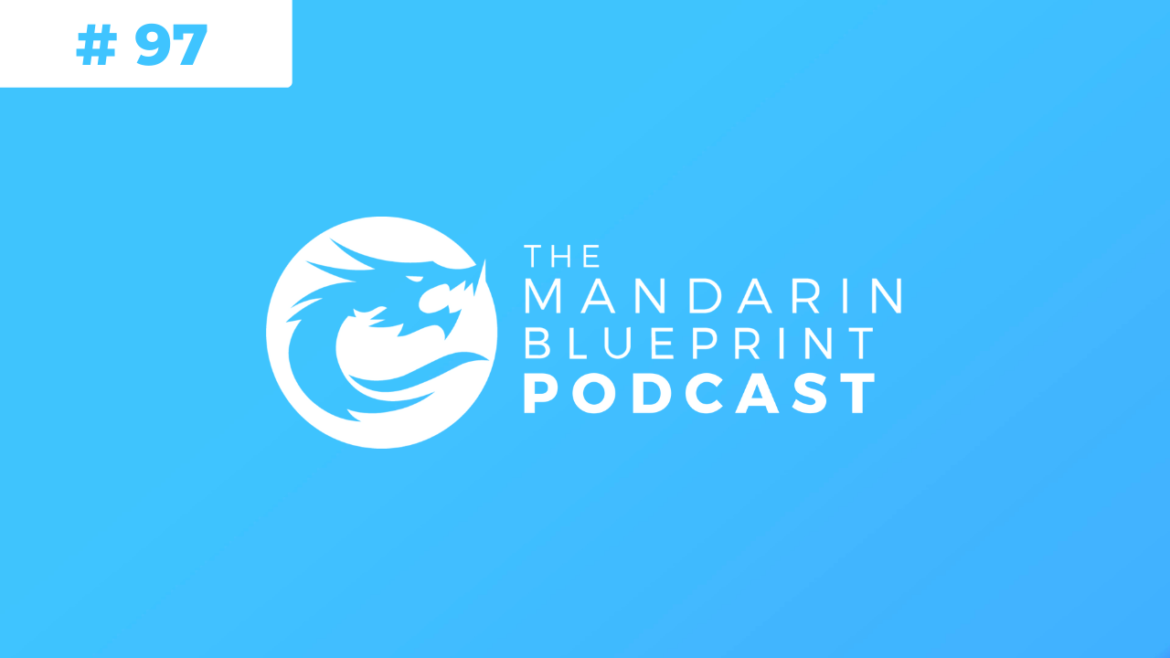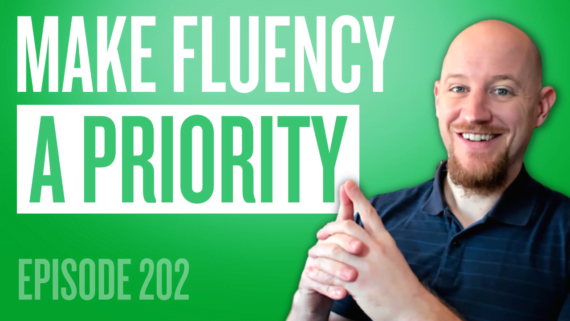
97. Two Ways to Say “Or” in Mandarin Chinese
欢迎光临! Welcome!
You can now subscribe to the podcast by the links below, or you can subscribe by copying the following URL into your favorite podcast APP.
The Mandarin Blueprint Podcast focuses primarily on The Blueprint online curriculum. Creators Luke Neale & Phil Crimmins answer questions and comments, discuss topics related to China and Mandarin learning, and have special guests.
Want to learn how to speak fluent Chinese fast? Join our free Webinar right here.
欢迎光临! Welcome!
You can now subscribe to the podcast on iTunes, Stitcher, Spotify, or you can subscribe by copying the following URL into your favorite podcast APP:
https://www.mandarinblueprint.com/feed/podcast/
The Mandarin Blueprint Podcast focuses primarily on The Mandarin Blueprint Method online curriculum. Creators Luke Neale & Phil Crimmins answer questions and comments, discuss topics related to China and Mandarin learning, and have special guests.
0:00 Affiliate Link & Reviews
Become a Mandarin Blueprint Affiliate
Leave us a Google Business Review 🙂
4:51 Grammar Point
GW-Connector-Or-In-Questions-连词-还是
&
GW-Connector-Or-In-Statements-连词-或/或者
Sentence 1:
小王: 你去过中国,对吧? – Level 14
Xiǎowáng: Nǐ qùguo zhōngguó, duìba?
Bill: 去过。
Bill: Qùguo.
小王: 去年还是今年?
Xiǎowáng: Qùnián háishi jīnnián?
Bill: 去年一月和今年二月。
Bill: Qùnián yīyuè hé jīnnián èryuè
Xiaowang: You’ve been to China before, right?
Bill: Yes.
Xiaowang: This year or last year?
Bill: January last year & February this year.
Sentence 2:
你想打包还是在这儿吃呢? – Level 17
Nǐ xiǎng dǎbāo háishi zài zhèr chī ne?
Do you want to take out or dine in?
Sentence 3:
走东边还是西边? – Level 19
Zǒu dōngbiān háishì xībiān?
Walk to the east or the west?
Sentence 4:
我用勺子吃面或面包。 – Level 13
Wǒ yòng sháozi chī miàn huò miànbāo.
I use a spoon to eat noodles or bread.
Sentence 5:
他们考得好的话,你还得送他们现金或者一些很贵的东西。 – Level 22
Tāmen kǎodehǎo de huà, nǐ háiděi sòng tāmen xiànjīn huòzhě yīxiē hěnguì de dōngxī.
If they do well on their tests, you have to give them cash or something expensive.
Sentence 6:
或者你走,或者我走。 – Level 27
Huòzhě nǐ zǒu, huòzhě wǒ zǒu.
Either you go, or I go.
14:17 Comments & Emails
Deborah Driscoll on New Vocab Unlocked for 计划
Is there much difference between 计划 and 打算 ?
ANSWER:
The differences are subtle, and I’d count on your intuition as you continue to get input, but here’s the low-down:
‘打算’ can mean ‘intend to,’ which helps delineate one of the differences. For example, if I say “我打算去法国旅游 Wǒ dǎsuàn qù Fǎguó lǚyóu – I intend to go to travel to France,” I’ve not made any solid plans. It’s just something I intend to do someday. It’s just a thought. “我计划去法国旅游,” on the other hand, is a bit more formal and the plan is set. The more objective and solid the plan is, the more appropriate 计划 is.
16:48
Corinna Wetzel by CommunityHi everyone,
I’m back to learning Mandarin after starting back in University from 2006 to 2009. I spent 4 months in Shanghai in 2008, but I couldn’t really talk all that much, despite having studied the language for quite some time by then. I mean, I was able to say hello and to tell the taxi driver where to go, but that was about it.
After the 4 months in Shanghai, I unfortunately kinda lost interest in the language for a long time, but I was lucky enough to still remember most of the Pinyin pronunciation. Nevertheless, I started out with the Pronunciation Mastery Course a couple of weeks ago, after trying out three other routes before. Let me just say that Luke and Phil changed my look at Mandarin completely. The studying is so much fun and I practically have to force myself to stop watching the videos and adding more Anki cards every night, because I do still have to get up for my job in the morning.
It feels as if The Mandarin Blueprint Method is the perfect way for me. So thank you for this and for renewing my interest in Chinese. I’m looking forward to learning more and more.Best wishes from Germany!
– Corinnabtw, this gif was basically me last night, when the last video for the current character was “It’s a word!” instead of “pick a prop” 😉

18:39
David McKay by Community
Hi All
David here from Glasgow, United Kingdom. I just signed up after spending some time researching into other online language providers. The Mandarin Blueprint guys presented as the most professional and organised outfit so here I am! A complete beginner who is keen to learn a language and learn about a culture that seems so impenetrable to the Western world. I’m curious, excited and a little nervous at the same time. Hopefully I haven’t bitten off more than I can chew!
Regards,
David
20:33
Aariel Holley by Community
Hey all quick thing I was wondering! Is it is it necessary to change the number of reviews anki allows each day? I think the default amount is 200 but when I experimented and set it higher anki showed more reviews. Is it necessary to change it? Or is it best to keep it a default of 200 a day.
22:54
Andrew Clapham on BONUS GRAMMAR POINT: #GW-Helper-Possession-助词-的
I feel like Phil’s chinese mastery, confidence, self-assuredness
and pure unbridled testosterone has absolutely peaked in this
lesson.I’m changing my prop for 亻 from Arnold Schwarzenegger to Phil
Inspiring bro ?
23:37
Christopher Weeks on Level 4 Complete
Seeing not just what you have achieved, but what is coming up is
extremely motivating. Also, dividing the words into their
different parts of speech, is excellent.I am sure this took a lot of time to do for each level, but I am
very glad you did it.
25:16
kym Thomas on New Vocabulary Unlocked! 桌子
i cannot believe i can actually read these sentences. Yes, i
read them very slow, however i’m astonished how quickly i have
been able to learn, read characters and sentences. This course is
amazing. Phil and Luke – cheers!!! i’m looking forward to being
fluent and literate by this time next year!! (possibly sooner)
27:53
Leonor Provencal on (BONUS) Character Analysis of 习 xí
Thank you for the great way of teaching. I am a slow learner and
it’s hard for me to get used of pronouncing the words properly
and understanding where the words came from or I could say root
word. But now I understand and It is easy to used them because I
learned how to used them as prefix or can be suffix.
Thank you, Phil and Luke!
29:15
Corinna Wetzel on BONUS: The Chinese Learning UNIQUE Problem…and How to Fix it
The first three years I studied Chinese in university were the
same for me as what Luke just said in the video. We were more
focused on speaking and pronunciation than on writing characters.
I mean, we learned some of the stroke order rules and a
charactere here or there, but I could never remember them well.
When I spent some time in Shanghai, I was able to recognize a
character every once in a while, but never to the point of being
able to write them myself.
Your course really helps with this. Thanks to the mnemonic
devices (which are getting easier and easier with each character)
I’m learning so quickly and it’s so much fun. 🙂
30:34
Julio Novoa-Barron on It’s a Word! 块
I am confused….both 块 and 快 are pronounced the same but have
different meanings. Would you care to explain them to me?
Thanks
32:26
Christopher Thompson on New Vocabulary Unlocked! 想法
I think I am starting to get the hang of sentences like this.
我认识很多有想法的人。
At its core, the sentence starts with the host (我 = I) and the
action (认识 = know) and ends with the guest (人 = people). The
basic underlying idea is that “I know a lot of people” and we are
just modifying that (what kind of people), so it’s a bit like
saying “I know a lot of idea-having people” and that structure is
used a lot.
35:38
William Beeman on New Vocabulary Unlocked! 目的
What’s the difference between 帮助我 and 帮我? What does 助 add?
(Ignore this question if it is irrelevant at this point, but
there seem to be a lot of constructions like this where a second
word sometimes gets added to a primary word like 帮, and sometimes
is omitted).
39:23
Tahtimi on It’s a Word!
Is it a good idea to choose the whole list of sets and actors
(male, female etc as mentioned in your e-book) BEFORE I get
started with the video course?I feel like that way I will end up working with places and
people I really want to work with long term, while watching the
videos I have a hard time coming up with something “of my own”
and feel very conditioned by the suggested places and people that
may not mean so much to me. (Props I thought I´d pick with the
videos and mostly go with your suggestions when they feel “rigth”
to me.)Also, even if creating a list of my own before getting started
feels like a lot of work I think having that part “done” from
before will also take away much of my initial “oh but this is SO
complicated” feeling that I get watching the videos. (I DO trust
it is worthwhile and gets easier though!)Another question:
Generally when I think about “watching a movie” it´s on a screen
and I myself am not part of it. Is it good to “watch” these
movies like that or is it better to see it with myself right
there at the set, in 3D “reality”? If so, is it OK for me to be
one of the actors and participate, or should I be just the
“director”, always right there at the set, but not interacting,
always “off camera”?
43:14
Igor Alenc on Simple Final Ü (YU): 去 qù
I have a tough time with this one. I feel like I’m making a “ch”
sound instead of “Qu.” Any help on that? I’m loving the course
btw. Greetings from Brazil!
45:11
Joan Hill on Grammar Break: Asking Yes or No Questions with 不
When the tone changes on the bu I see it still has the same
character so how would I know this if I was reading this sentence
?
46:37
Nacho En on New Vocabulary Unlocked! 关心
Hey Luke and Phil. Is there any difference between 担心 and 关心?
48:51
Andrew Clapham on It’s a Word! 记
I thought it was interesting that the “的话” in the sentence
“请记一下我的话。” is attached to the “我” meaning “words of mine” in a
way. But that in the other sentence, “明年你来中国的话,来找我吧!”, the “的话”
is attached to the entire first half, making it conditional / a
predicate. Imagine if the predicate happened to end in “我”!
50:21
Julie Hentschel Lund on (BONUS) Our Top Five Most Difficult Tone Pairs
I don’t really have a problem with the tone pair 3rd-2nd. I
always try to remember that the 2nd tone seems to take “longer”
time to say, whilst 3rd tone is “shorter” but deeper, and the 1st
tone is just monotonous and high. With 4th tone I try to imagine
the word falling down a hill. Sounds silly, but it helps me to
visualise the pronunciation.
50:56
Julie Hentschel Lund on Pick a Prop 半
Ok, so I chose a half-moon as the key to represent “half” in the
movie of ban4. But since you said the prop should not only be in
3D but also interactive, the half-moon wouldn’t be a valid
option, right? Or should I make the half-moon into a
half-moon-pillow?So essentially, would it be a good idea to have two separate
objects as the key and a prop?
52:20
Stephanie Arapian on It’s a Word! 本
The third example is interesting as “kan” seems to alter meaning
to read instead of look or see. I can definitely understand that
looking/seeing a book implies reading it, but curious because I’m
sure there’s another character for ‘to read’, yes?
53:27
Christopher Thompson on Make a Movie 怕
Ah, this is what I get for zipping through so quickly! I missed
that the “emotion radical” is a variant of “xīn” and so it failed
to register that this was another form. Thanks for the heads up
and I shall endeavor to pay closer attention in the future. The
good news is that, by combing through previous lessons, I got to
do a nice review of the material!
54:25
Julie Hentschel Lund on Level 2 Complete
Is it possible to replay/listen to a card’s audio when I’m in
“Browse”? Like a command or something?
54:56
Julie Hentschel Lund on BONUS: SRS – The Frequency Game
I absolutely love Anki! I’ve been using it for years and
actually wrote my final paper (30 pages) in Swedish high school
about it. I examined the correlation between second language
learning in elementary school, their final grades, language
methods they used and finally, what their ACTUAL level was
according to the Common European Framework of Reference for
Languages (CEFR).I found out several things:
1. After 3 years of learning their second language, the majority
were still on an A1-level (total beginner). Despite this low
level, most of these students got the highest grade possible (B
or A).2. The ones who had used similar methods to Anki/SRS, and had
made a conscious effort to review what they’ve learned over a
longer period of time, actually managed to reach a higher level
of “fluency” ( A2-B1). Though they didn’t necessarily get the
highest grades. This was partially because of the teachers’
strict ways of assessing their students.Although this research paper has some flaws ( I only had 202
participants in the survey), it still shows a pattern. With
determination to learn Chinese and finishing these Anki cards
everyday, we can then all reach our language goals in the most
effective way. Anki might not be the most flattering software,
but hey, it’s the content that counts 😉
57:25
Ric Santos on Moving Forward: Shadowing
For the past 2 weeks, I skipped this lesson (Unit 10: moving
forward) because I thought I know what shadowing is. Now After
listening to your talk and doing shadowing but with moderate(
slow) Bachata music in the background, I dance around the room in
a safe limited space listening to an easy Chinese beginner
mini-story! This is a very good tip indeed. and the dance
music is in itself limited more or less to 5 minutes. so I
either repeat the music and or dance to something I am familiar
with the steps with and it “mixes” with the story in Chinese (
with Spanish music in the background- Despacito!) Thanks for the
tips. Now I will have to look for other short stories…
58:57
Gareth Edwards on MAKE A MOVIE 吗
If I am having trouble picturing the roof of the set is it ok to
just make it up? I can remember where I lived in Beijing but it
was a high rise block of flats so had no access to the roof.
59:51 Movies!
This blog post explains the theory behind Movie Scenes and learning characters.
Rebecca Wheble on Make a Movie 亡
Woody has come back to my -ang set (in the tropics) to discover
that the power has failed and all the food in the fridge
(kitchen) has perished. The smell is so bad that he ties a top
hat to his face to breathe through. He uses the stick to prop
open the fridge door and the razor blade to scrape out the
perished, liquified food.
1:00:45
Irene Ong on Make a Movie 总
How about a current event??? I have made most of my finals as
countries.ZEE arrives safely in Hong Kong even though his family warns him
of the political unrest there. He steps into his bedroom and is
confronted by a heart sitting on the table. Suddenly a pair of
horns start hovering above, and out jumps Cookie Monster mouth
and he reminds ZEE to “ALWAYS be careful”.
1:02:39
Georg Lohrer on Make a Movie 江
In front of my ang-site a horrible accident has happened. An
I-Beam has crashed down from a construction area directly onto a
car of a Chinese food delivery service. As Julia Roberts arrives
at the scene she wonders why the bottle of water still stands on
the car and has not fallen down. She also recognizes the special
name of the food delivery service: “YANGTZE RIVER restaurant”.


